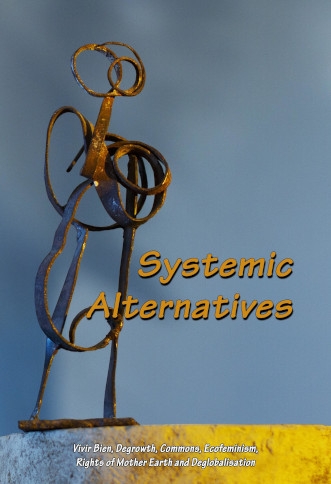Friends of the Earth Helsinki are organizing a study circle that is about to have its first session on Wednesday, April 1st, at 18.00. The meeting will be online. The language of this study circle is English.
In the study circle, we will meet every two weeks to discuss chapters of a book (or similar) that we agreed upon beforehand. We have identified two media that we will go through in the next couple of meetings:
- The freely available book "Systemic Alternatives" by various authors (description and link below)
- Environment-related episodes of the podcast "The Ezra Klein Show"
In the next meeting, the discussion will be about the following two things:
- Chapters 1 and 2 of "Systemic Alternatives" (Introduction and "Vivir Bien" by Pablo Solón)
- The Ezra-Klein-Show episode called: "We live in The Good Place. And we’re screwing it up." (description and link below)
If you would like to participate without having read or listened to the material, you are still welcome to join.
To participate in the meeting, you can use a web browser or a smartphone app. There is no need to register anywhere.
If you use the web browser on your computer, you can participate without installing any additional software by visiting the following address around the time of the meeting:
https://meet.jit.si/FoE-Helsinki-Study-Circle_2020
Note that Chrome or Chromium are recommended at this point. The browser will ask you to allow the use of the microphone and webcam. If you don't have a webcam or don't want to use it, that's fine. Please make sure in the sound settings of your computer that the microphone is not muted. Headphones or a headset are recommended for better audio quality.
If you want to participate with a smartphone, download the "Jitsi Meet" app (available for Android and iOS) and then enter the room name FoE-Helsinki-Study-Circle_2020 to join the call. (In the app settings, https://meet.jit.si must be set as the server, but this should be the default.)
Material
Systemic Alternatives
Website: https://systemicalternatives.org/2017/03/10/book-systemic-alternatives/
PDF freely available: https://systemicalternatives.files.wordpress.com/2017/03/sa-final-ingles-pdf2.pdf
Summary
The premise of this publication is that we are living a systemic crisis that can only be solved through systemic alternatives. Humanity is facing a complex set of crises from environmental, economic, social to civilizational crisis. All of these crises are part of a whole. We cannot solve one of these crises without addressing the others.
The construction of complementarities between Vivir Bien, degrowth, commons, ecofeminism, Mother Earth rights, deglobalisation and other visions is essential to forge systemic alternatives to capitalism, productivism, extractivism, patriarchy and anthropocentrism. The main goal of this publication is to promote a constructive and creative dialogue between these different visions.
The Ezra Klein Show
Official website: https://www.vox.com/ezra-klein-show-podcast
Next session's episode:
We live in The Good Place. And we're screwing it up.
Available on various sources for podcasts; for example: https://www.stitcher.com/podcast/vox/the-ezra-klein-show/e/64883521
Summary
Welcome to the first episode of our climate cluster. This isn’t a series about whether “the science is real” on climate change. This is a series about what the science says — and what it means for our lives, our politics, and our future.
I suspect I’m like a lot of people in that I accept that climate change is bad. What I struggle with is how bad. Is it an existential threat that eclipses all else? One of many serious problems politics must somehow address?
I wanted to kick off the series with someone who knows the science cold. Kate Marvel is a research scientist at NASA’s Goddard Institute for Space Studies and a professor at Columbia University’s Department of Applied Physics and Mathematics. But Marvel isn’t just a leading climate scientist. She’s also unique in her focus on the stories we tell each other, and ourselves, about climate change, and how they end up structuring our decisions. We discuss:
- How a climate model actually works
- Why this is the good place
- Why there is so much variation in climate scientists’ predictions about global temperature increases
- Why global warming is only one piece of the much larger problem of climate change
- Why a hotter planet is more conducive to natural disasters
- The frightening differences between a world that experiences a 2°C temperature increase as opposed to a 5°C temperature increase
- Whether the threat of climate change requires solutions that break the boundaries of conventional politics
- The underlying stories that animate much of the climate debate
- Whether the planet can sustain continued economic growth
- What it means to “live morally” amid climate change
